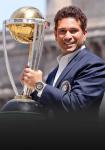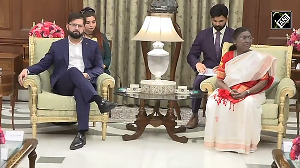Such is the news of the choice of Hamid Ansari as the ruling coalition's candidate for Vice-President. At a time when it appeared that politics was descending to a new low, the discovery of Ansari has rekindled hopes that India still has the possibility of rising above partisan politics and to find true patriots with integrity to shoulder State responsibilities.
After all, ability and probity too have their rewards.
The Leftists, reports say, chose Ansari because he opposed the India-US nuclear deal and the US policies in Iraq, Iran and Palestine. Hopefully, they must have chosen him more for his intellectual honesty, efficiency and commitment.
In his career in the Indian Foreign Service and elsewhere, his qualities of head and heart were clearly visible. But it must have come as a surprise to him that these qualities are still recognised.
"A gentleman to the core" is what I thought of him when I first met Ansari as the Chief of Protocol during the Nonaligned Summit and it is the same tribute I paid him as he left New York after two years as India's Permanent Representative to the United Nations. In between, he served with distinction in Canberra, Kabul and Tehran. As heads of neighbouring high commissions in the South Pacific, we worked closely and I received great support from him for my work in Fiji. He was our kind host in Canberra. And when he came to New York as my immediate boss, I could not have wished for more.
As a senior colleague, he was impeccable in terms of generosity, graciousness, support and encouragement to a younger colleague. Sadly, many in the bureaucracy tend to kiss the seniors and kick the juniors.
Ansari's appointment as the Permanent Representative to the UN was a surprise as he did not belong to the so-called 'UN mafia' in the Indian Foreign Service. He had not served before either in any of the multilateral posts or in the UN Division at the Ministry of External Affairs.
By appointing him Permanent Representative, Foreign Secretary J N Dixit was making a point that previous experience of the UN was not a necessary pre-condition for the success of a Permanent Representative. More important than the knowledge of 'UNese' or UN procedures was the mastery of Indian interests and the diplomatic skills to pursue them. For the UN techniques and procedure, there were several of us in the Mission to guide him.
In fact, matters turned out exactly like that during his tenure in New York. We had great respect for his wisdom, experience and commitment and he valued our familiarity with UN procedures and regulations In the event, we had a tremendous equation that enabled us to face the special challenges of the time in New York.
Credibility is extremely important in multilateral work. News spreads like wildfire in the UN and no one can escape by tailoring his words to suit his immediate interlocutors. In no time will he be caught for contradicting himself. Nor should multilateral diplomats take at face value what they are told. Confidential conversations are not the right tools for multilateral diplomats.
Ansari's natural talent for transparency and credibility won him instant friends at the UN. His disarming manner and truly aristocratic demeanour won hearts all around. He let me handle important negotiations, such as those on reform of the UN and the mandate of the UN High Commissioner of Human Rights, but his deep knowledge of issues and his instinctive understanding of international issues were invaluable in reaching our targets.
He personally handled the negotiations leading to the World Social Summit and made a substantive contribution, but he moved out of New York before the Copenhagen summit.
Ansari's tenure in New York coincided with the special efforts that Pakistan mounted at the end of the Cold War to gain ground in the UN on Kashmir. Pakistan staged a multi-pronged attack in various UN capitals and virtually in every forum. The strategy was to highlight the human rights angle in Geneva and the security angle in New York. Pakistan linked every issue to Kashmir and we had to counter its arguments everywhere.
Since it was decided in Delhi that the Permanent Representative should keep away from daily polemics in the committees, I was the designated Pakistan basher as the Deputy Permanent Representative.
Hamid Ansari's mastery of the subject and his drafting skills were my main assets when I took on Pakistani representatives day by day. Often, he sat back in the visitors' gallery to watch the fireworks. He was generous with compliments and pats on the back every time we finished a bout of battle with the Pakistanis.
The debates were not as important as the quiet diplomacy that Ansari conducted behind the scenes. Pakistan did not succeed in getting any resolution in any forum at the end of two years of desperate struggle.India had won the battle under Ansari's leadership. Foreign Secretary Dixit proved himself right.
Ansari's success in the UN is testimony to the fact that a brilliant mind and personal charm are more important than long years of drafting or debating experience in the conference halls on the East River. In two short years, he accomplished much and moved on to Saudi Arabia to win laurels for India.
Hamid Ansari has not stopped working even after several years after retirement. After his extended term as ambassador to Saudi Arabia, he went into education, which has always been a passion for him. He also worked for the Observer Research Foundation before joining the Minorities Commission. On Iraq, Iran, Afghanistan and Pakistan, he threw new light in his columns. It was not ideology, but India's national interests that guided his judgement. The heavy responsibilities of his new office should not stop him from contributing to international affairs and education.
Like other good people with a sense of decency and rectitude, Hamid Ansari is susceptible to exploitation by selfish people and there have been instances of it happening inside and outside the Foreign Service. He does not raise his voice against actions of authorities, even when he himself recognises them as unfair. Long after both of us left New York, I wrote to him as to how a particular administrative action by the ministry had turned out to be wrong. His response was that, having remained quiet about such matters even while in office, he was not going to comment on it, now that he had left the Foreign Service.
The challenges of public life will be formidable in this context. Chairing the Rajya Sabha will present its own hazards to him. But he should be able to rise to the occasion, as he has done in other incarnations.
His transparent goodness and sense of fairness should disarm even the most undisciplined and rude of people.
T P Sreenivasan, now retired from the Indian Foreign Service, served as India's former ambassador to Austria among other diplomatic posts.







 © 2025
© 2025